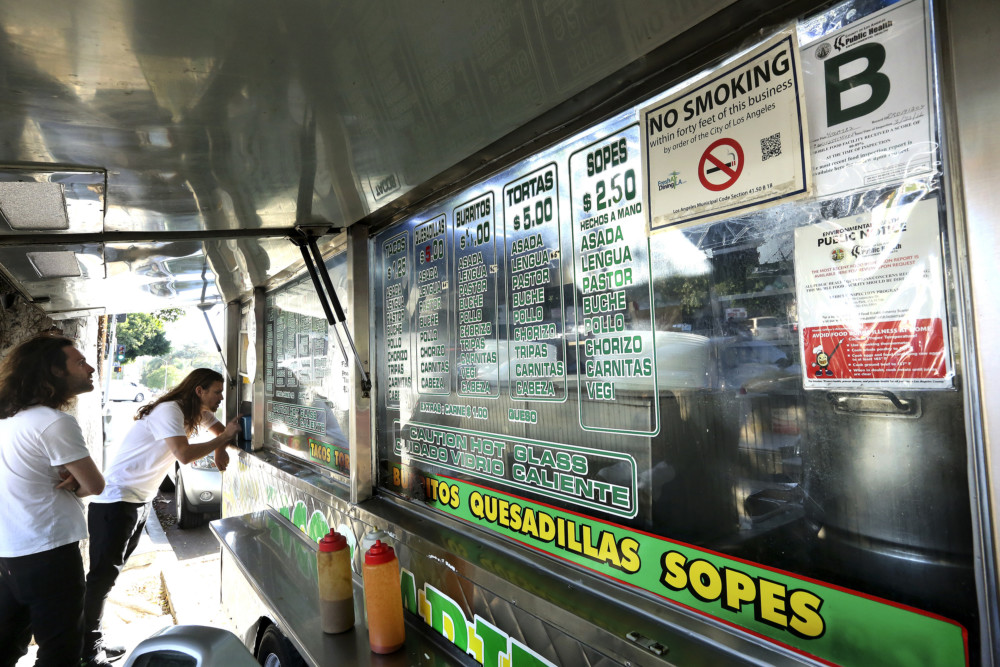By Alexia Elejalde-Ruiz
Chicago Tribune
WWR Article Summary (tl;dr) Chicago food truck operators including “Cupcakes for Courage” owner Laura Pekarik, who brought the original lawsuit; say the city’s restrictions have driven entrepreneurs out of business and stunted the local food scene.
Chicago Tribune
The battle to overturn Chicago’s food truck regulations heads Wednesday to the Illinois Supreme Court, which will consider whether restrictions meant to protect restaurants from their wheeled competitors are unconstitutional.
Despite losing twice in the lower courts, Cupcakes for Courage owner Laura Pekarik, who brought the lawsuit in 2012, said she is confident she will prevail.
“What’s right is right, and you can’t protect one industry from another,” said Pekarik, who started her cupcake business out of a food truck and now runs two bakeries in the suburbs.
Chicago food truck operators say the city’s restrictions have driven entrepreneurs out of business and stunted the local scene even as it has thrived elsewhere in the nation.
About 65 food trucks currently operate in Chicago, half the number that roamed the streets before the city ordinance was adopted in 2012, estimates Gabriel Wiesen, president of the Illinois Food Truck Association and owner of Beavers Donuts, which operates three food trucks and a store in the French Market.
The Illinois Supreme Court is set to hear oral arguments in Springfield on Wednesday morning, but a ruling isn’t expected for several months.
Pekarik’s lawsuit challenges a rule prohibiting food trucks from parking within 200 feet of any establishment that serves food, a category that includes convenience stores with hot dog rollers.
The suit says the rule violates food trucks’ right to due process and equal protection. Another part of the law that mandates GPS devices so that the city can track the whereabouts of food truck violates privacy protections, the suit claims.
A state Appellate Court in late 2017 affirmed a trial court’s decision to uphold the rules, writing that the city has a “critical interest in maintaining a thriving food service industry of which brick-and-mortar establishments are an essential part.”
Bill McCaffrey, spokesman for the city’s Law Department, declined to comment on the pending litigation except to issue a statement: “Chicago’s food truck ordinance has already withstood the scrutiny of two courts. More importantly, the regulations strike the right balance between the interests of food trucks and restaurants and create a healthy environment in which both can flourish.”
But Pekarik’s attorney, Robert Frommer of the Institute for Justice, said the law “hobbles the little guy” to “prop up entrenched interests” that see new entrants as a threat.
“It’s not government’s job to pick the winners and losers,” Frommer said. “That’s the job of consumers.”
Consumers craving a lobster roll or tamale dished from a truck window can only find them in select spots downtown. The vast majority of the Loop is off-limits to food trucks because of the 200-foot rule, creating stiff competition for the few available spots that some have likened to a “wild west” environment.
The city has established stands where food trucks can gather, but most are in locations with poor foot traffic and the few downtown can only accommodate a truck or two, said Wiesen.
“It’s been extremely cumbersome and has limited the number of food trucks that can operate,” he said.
Pekarik ceased her regular food truck route because the limited parking prevented her from promising customers she would be in a certain location, and she feared getting a ticket. Violations of the ordinance carry a penalties of $1,000 to $2,000.
Her cupcake truck is now used only for catering or special events and most of Pekarik’s business comes from her storefronts in Elmhurst and Oak Park. But if the city eases its restrictions “my truck will definitely go on the road like it used to,” she said.
The Illinois Restaurant Association supports the 200-foot rule as “fair” to restaurants that have to pay property taxes and abide by regulations of their own.
“Every business has to follow zoning restrictions, and we just feel this is a zoning restriction,” said Sam Toia, CEO of the trade group, which represents restaurants as well as some food trucks.
Toia also favors the GPS rule as important for the city to conduct health inspections.
The decline of food trucks in Chicago could be due to factors other than the regulations, such as lack of capital and typical competitive pressures that sink restaurants all the time, he said.
buy viagra super dulox force online www.ecladent.co.uk/wp-content/themes/twentyseventeen/inc/en/viagra-super-dulox-force.html no prescription
But Toia is open to changing other rules that food trucks dislike, such as extending the two-hour serving limit to four hours. He also encourages opening more food truck stands, particularly outside of colleges where he suspects they would find an eager audience in hungry students.
Meanwhile, food trucks continue to close their doors. Dion Solano, co-owner and executive chef of Jerk, a Jamaican grill that was one of Chicago’s first food trucks to cook food on board, took his truck off the road last year because there aren’t enough viable parking places to make money consistently without breaking any laws.
“It hurts,” said Solano, who has his truck listed on Craigslist. “I have built relationships with a lot of good people in the industry who have great concepts, great food and they have to close up shop and fail and lose money.”
Solano, like many food truck entrepreneurs, was able to parlay his early mobile success into a Jerk bricks-and-mortar restaurant, which will remain open. He would be happy to have food trucks lined up outside his door if it wasn’t illegal, because he feels people typically already know what they’re looking for when they step out for a bite.
Still, he feels an emotional loss to see his food truck idled because it gave him his start, and he worries others won’t have the same chance.
“When I consult (food truck entrepreneurs), I sadly have to start off with: ‘You don’t want to do this.'”














































































































































































































































































































































































